What to Know
Bichon Frises are small, fluffy, and lovable companions that easily become a cherished part of the family. Though these affectionate dogs bring joy to their owners, many people may wonder: can Bichon Frises be left alone? The answer depends on several factors, including the dog’s age, temperament, and training.
Understanding the nature of the Bichon Frise is important when considering leaving them alone. Like most dog breeds, the ability to handle solitude varies among individual dogs. Some Bichon Frises may be comfortable being left alone for several hours, while others may struggle with separation anxiety. Proper training and preparation are essential in ensuring that your Bichon Frise can confidently handle being left alone.
Key Takeaways
- Bichon Frises‘ ability to be left alone depends on their age, temperament, and training.
- Proper training can help Bichon Frises develop independence and confidence when alone.
- Assess for signs of separation anxiety and provide mental and physical stimulation to promote their well-being while you’re away.
Understanding Bichon Frise
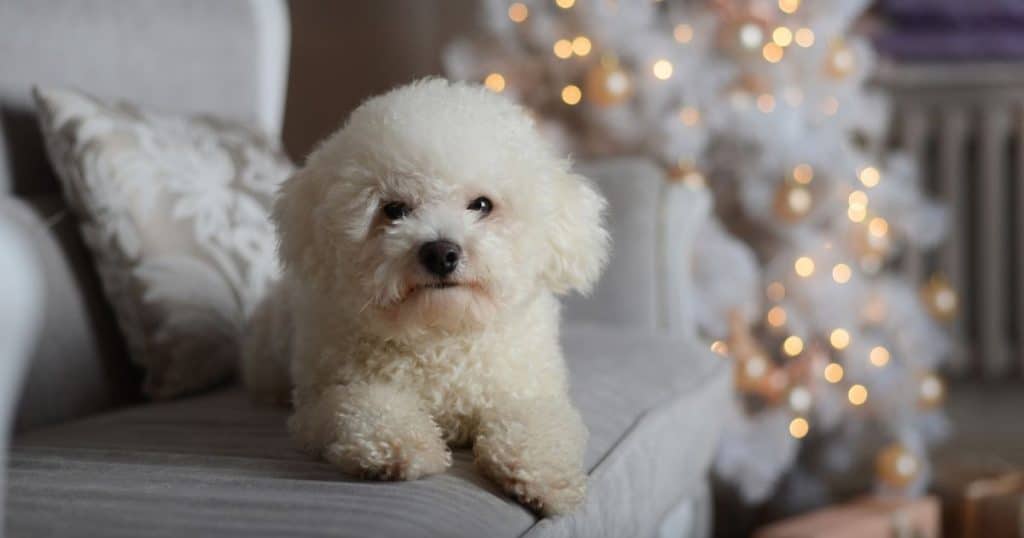
When considering whether a Bichon Frise can be left alone, it’s important to take into account their breed characteristics, temperament, and adaptability to different environments. Bichon Frises are small, hypoallergenic dogs that have a friendly and affectionate nature. They are well-suited for apartment living due to their size and moderate energy levels.
The temperament of a Bichon Frise is generally sociable, cheerful, and intelligent.
They thrive on human companionship and are known for getting along with other pets and children.
However, their strong attachment to their owners can make them prone to separation anxiety if left alone for extended periods.
Therefore, it is vital to gradually introduce the idea of staying alone to your Bichon Frise and provide them with proper mental stimulation and toys to keep them occupied while you’re away.
Being relatively independent dogs, Bichon Frises can adapt to being alone if given the right tools and training.
Crate training, for example, can create a safe space for your dog where they feel comfortable and secure when you’re not around.
It is essential to start this process when they are still puppies and gradually increase the time you leave them alone.
Keep in mind that Bichon Frises are not suited to be left alone for very long periods, as they require regular interaction and exercise to stay happy and healthy.
Can Bichon Frise Be Left Alone
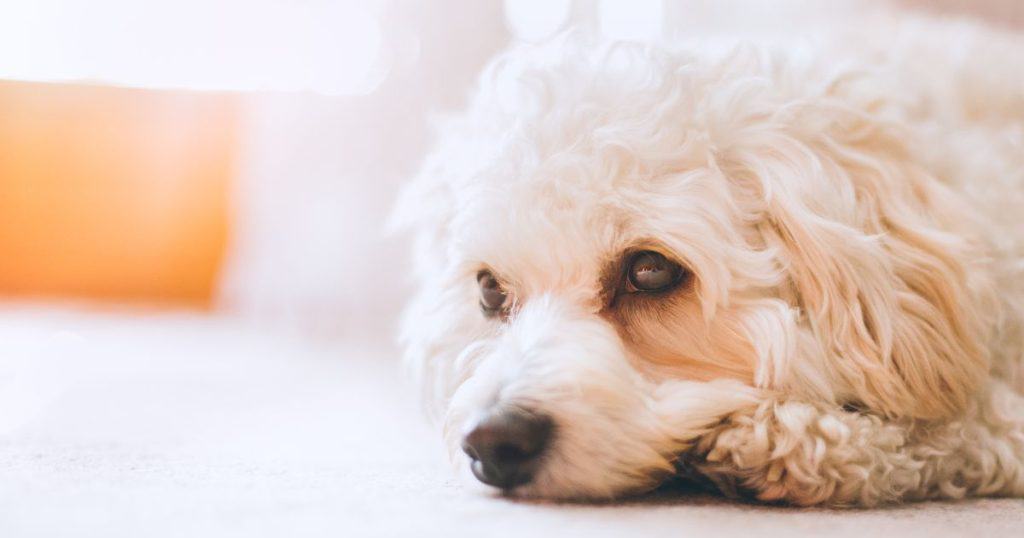
As a Bichon Frise owner, you might be wondering if it’s okay to leave your beloved companion alone at home.
Bichon Frises are highly social animals; however, they can adapt to being left alone for short periods if properly trained and provided with the appropriate environment.
The first thing to consider is the age of your Bichon Frise.
If you have a young puppy, try not to leave it alone for more than a couple of hours at a time.
Puppies require frequent care, including regular feeding, playtime, and bathroom breaks.
As your Bichon Frise gets older, it becomes more capable of tolerating longer periods without human interaction.
It’s crucial to teach your Bichon Frise to feel comfortable when left alone gradually.
Start by leaving for short periods, gradually increasing the interval over time.
In order to set your Bichon Frise up for success during alone time, create a safe and comfortable environment.
Provide a designated area with a comfortable bed, food, water, and toys.
You can also consider leaving on some soothing music or a television in the background to provide a sense of comfort and normalcy.
Another aspect of preparing your Bichon Frise to be left alone is ensuring it gets adequate mental and physical stimulation when you’re together.
Regular exercise is essential in helping deter separation anxiety.
Remember that every dog is different, and some Bichon Frises may not cope as well as others when left alone.
Even with proper training and a comfortable environment, some dogs may still experience anxiety or unwanted behaviors.
In these cases, it might be useful to consult a professional dog trainer or behavior specialist for tailored advice.
Factors Influencing Solitude
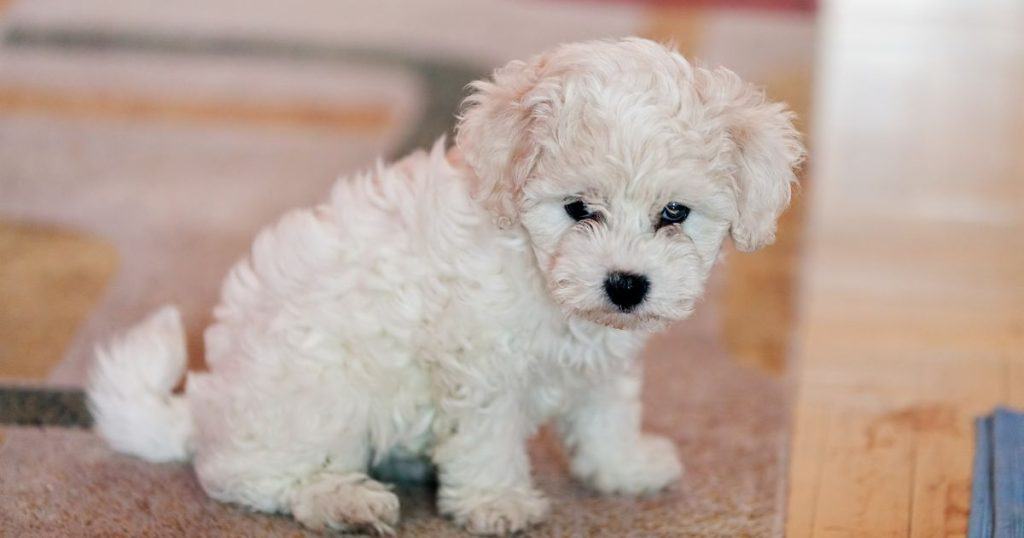
When considering whether a Bichon Frise can be left alone, there are several factors to take into account.
These factors include your dog’s routine, environment, health issues, age, exercise, and food requirements.
A consistent daily routine plays a significant role in your Bichon Frise’s comfort while being left alone.
Establishing regular times for meals, playtime, and walks, will help them feel more secure and adjust to your absence more easily.
Make sure to create a supportive environment for your pet by providing them with a safe and comfortable space.
Another essential factor is the age of your Bichon Frise.
While puppies require more attention and may struggle with being left alone, adult dogs that have developed independence can handle solitude for longer periods.
Keep in mind that this breed can be prone to separation anxiety, so ensure that you manage their time alone based on their individual needs.
Health issues might also influence how long your Bichon Frise can be left alone.
If your dog has any medical conditions, attending to their needs may require more frequent checks.
Exercise and mental stimulation are essential for a Bichon Frise’s well-being, especially when left alone.
Providing them with plenty of interactive toys and puzzles will help keep their minds occupied during your absence.
Additionally, ensure that they receive adequate exercise in the form of walks or playtime, which will help them burn off energy and remain content while you’re away.
Lastly, proper nutrition is crucial for your Bichon Frise’s overall health.
When leaving your dog alone, make sure they have access to their food and fresh water to meet their needs throughout the day.
You may also consider an automatic feeder to dispense their meals at regular intervals, ensuring they maintain a well-balanced diet.
By considering these factors and your Bichon Frise’s individual needs, you can create a supportive environment that will make it easier for them to cope with solitude when left alone.
Remember that every dog is different, so adjust the approach according to your pet’s specific requirements to ensure their comfort and well-being.
Training Bichon Frise for Independence
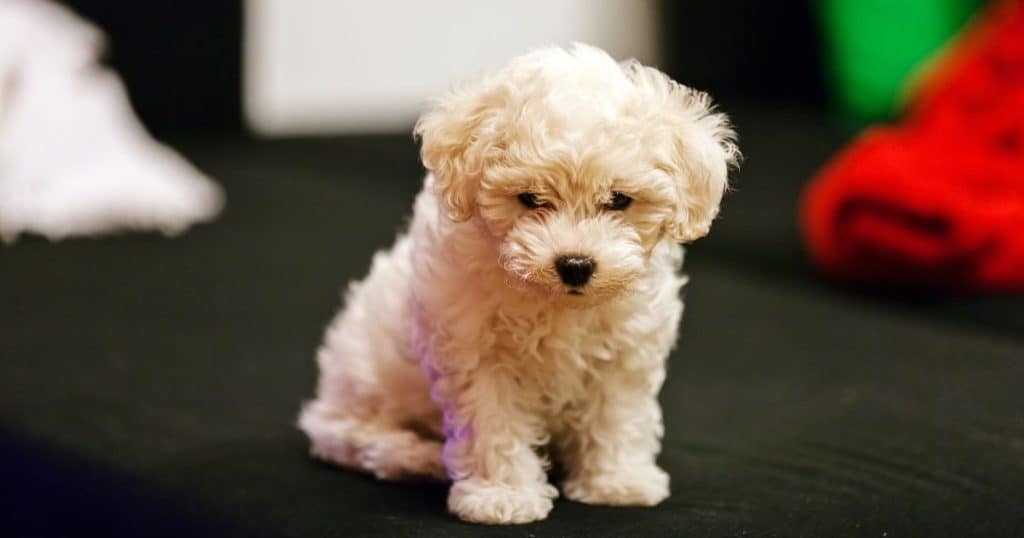
When you are raising a Bichon Frise, you may wonder if they can be left alone while you are away.
With proper training, this breed can learn to be more independent and comfortable when alone.
Training methods such as crate training and positive reinforcement can be beneficial in achieving this.
Crate training is essential for Bichon Frise puppies, as it helps establish a safe and familiar space for them to stay in while you are gone.
Begin by introducing your puppy to the crate with the door open, allowing them to explore and become comfortable with it.
Gradually close the door and increase the time spent in the crate, making sure not to force your puppy in or leave them for too long.
Positive reinforcement is another key factor in training your Bichon Frise for independence.
Rewarding good behavior with treats, praise, or playtime can reinforce desired habits, such as staying calm when alone.
Also, create a predictable routine for your dog, ensuring they have regular meal times, play sessions, and opportunities for exercise.
As your Bichon Frise grows and becomes more accustomed to being alone, it is crucial to monitor their behavior for any signs of distress.
Howling, excessive barking, and destructive behaviors could indicate that your dog is not coping well with being left alone.
In such cases, it may be beneficial to consult a professional trainer or behaviorist to address these issues.
Potential Risks and Behavioral Issues
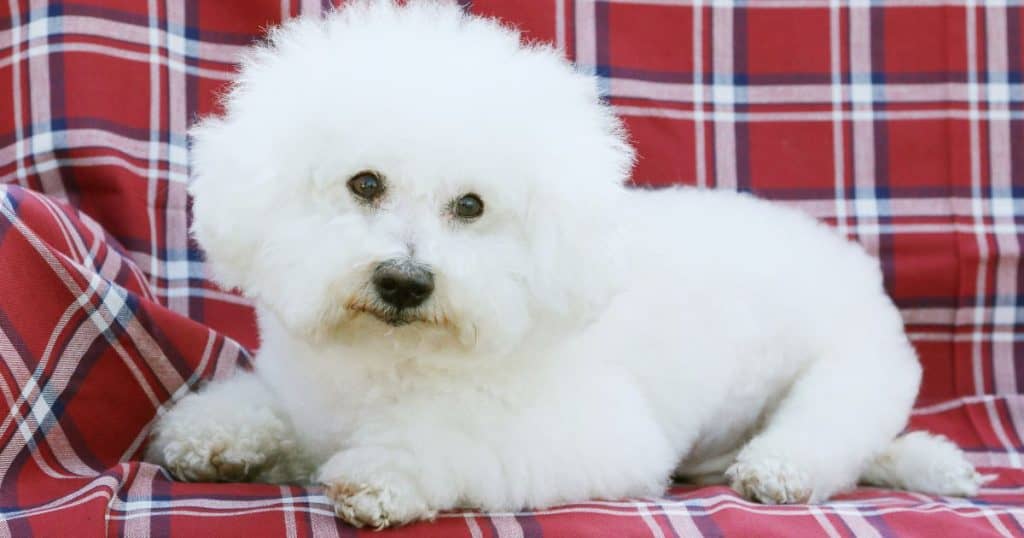
Leaving your Bichon Frise alone at home can lead to various risks and behavioral issues. While every dog is unique, it is important to understand the possible outcomes of leaving your Bichon Frise unattended for extended periods.
One common issue that may arise is aggression. Although Bichon Frises are generally friendly and affectionate dogs, they can become aggressive when left alone. This can result from anxiety and fear due to their owner’s absence. Aggressive behaviors can include growling, snarling, or even biting if they perceive a threat while home alone.
Destructive behaviors are another potential risk when leaving a Bichon Frise alone. Boredom and anxiety can lead to your dog chewing or biting furniture, scratching walls, and breaking things around your home. To mitigate this, providing toys and mentally stimulating activities may help to distract your dog while you are away.
In addition, some Bichon Frises may develop issues related to urinating and defecating in the house. This can occur when your dog becomes anxious or distressed due to being alone. To avoid this problem, ensure you allow your Bichon Frise ample opportunity to go outside and relieve themselves before leaving them alone.
To minimize the risks and behavioral issues associated with leaving your Bichon Frise alone, here are some tips to consider:
- Gradually increase the duration your dog is left alone to help them become more comfortable with the situation.
- Provide interactive toys and mental stimulation to keep your Bichon Frise engaged while you are away.
- Ensure your dog has a comfortable space to rest and a designated area for elimination if they are unable to go outside.
Remember, every dog is different, and it is crucial to pay attention to your Bichon Frise’s specific needs and behaviors when left alone. By taking the necessary precautions and being conscious of potential risks, you can help ensure that your furry friend stays happy, healthy, and well-behaved even when you’re not at home.
Signs of Separation Anxiety in Bichon Frise
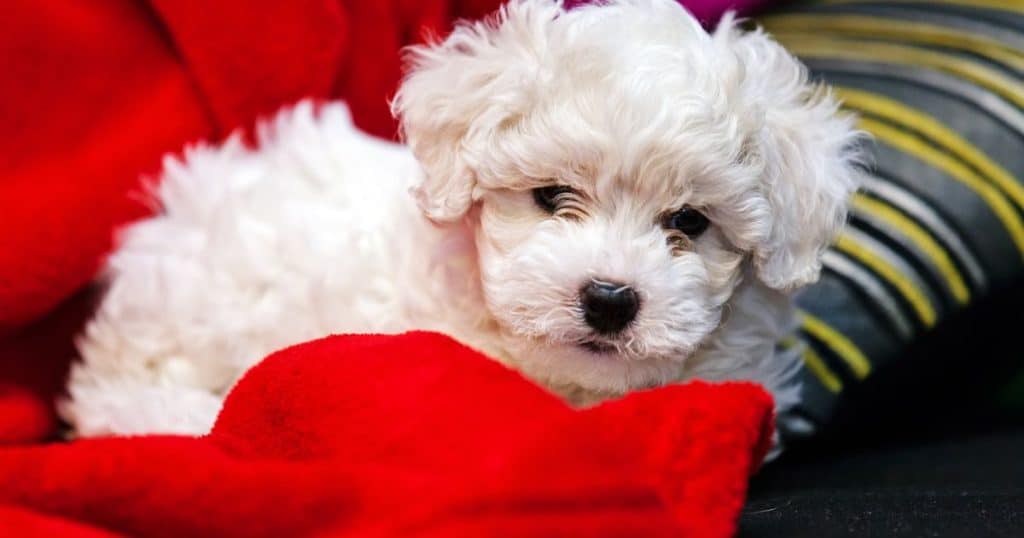
Separation anxiety is a common issue among Bichon Frises and can lead to various symptoms when they are left alone.
As a Bichon Frise owner, it is important to recognize the signs of separation anxiety and address them accordingly.
One primary symptom of separation anxiety in a Bichon Frise is excessive vocalization, such as barking, whining, or crying.
These vocalizations often occur when the dog is left alone and can be disruptive for both the dog and those living nearby.
Additionally, dogs suffering from separation anxiety may exhibit destructive behavior such as chewing on furniture, scratching at doors or windows, and even causing damage to their surroundings in an attempt to escape.
In some cases, separation anxiety can lead to physical symptoms such as vomiting, diarrhea, or even self-harm.
Other signs of separation anxiety in Bichon Frises may include excessive panting, drooling, or pacing.
In more severe cases, dogs may develop depression or anxiety-related responses such as trembling, shaking, or hiding when left alone.
To help alleviate your Bichon Frise’s separation anxiety, consider implementing strategies such as a consistent routine to make them feel more secure.
Additionally, try gradually increasing the amount of time they spend alone to help them adapt to the situation.
Training methods like positive reinforcement can be helpful in teaching your dog to cope with being alone.
If your Bichon Frise’s separation anxiety symptoms persist, you might want to consult with a veterinarian or a professional dog trainer for further guidance.
Helpful Tools for a Bichon Frise Left Alone
Leaving your Bichon Frise alone at home can be a challenge since they are known for being social and affectionate dogs. However, having the right tools and strategies can make a big difference in keeping your dog entertained and comfortable when you can’t be there. In this section, we’ll discuss various helpful tools that can be used when your Bichon Frise is left alone, focusing on toys, interactive toys, TV, radio, white noise, and crate training.
Toys are essential to keep your Bichon Frise engaged and physically active while you’re away. Providing a variety of toys, ranging from chew toys to puzzle toys, can help stimulate your dog’s mind and prevent boredom. Ensure to rotate the toys periodically to maintain your dog’s interest.
Interactive toys, on the other hand, offer an added level of mental stimulation. Treat-dispensing toys, for example, can be filled with your dog’s favorite snacks, encouraging them to problem-solve and stay busy as they try to access the treats. Similarly, interactive electronic toys can be set to turn on and off at random intervals, keeping your Bichon Frise guessing and engaged throughout the day.
Leaving the TV on while you’re away can provide your Bichon Frise with comforting background noise and visual stimulation. Channels featuring pet-friendly content or nature documentaries can be particularly captivating for dogs.
Radio can also be a great option for providing calming background noise, especially if your Bichon Frise has a preference for soft instrumental music or talk radio. Playing soothing sounds can help relieve anxiety and create a familiar environment for your dog.
White noise machines offer another option for creating a calming atmosphere. The consistent sound of white noise can help drown out any unexpected disturbances that may otherwise stress your Bichon Frise.
Lastly, crate training can be a useful tool for managing your dog’s environment when they’re left alone. A properly sized and comfortable crate can serve as a safe and familiar space for your Bichon Frise. This can help reduce anxiety and prevent unwanted behaviors while you’re away.
Overall, providing your Bichon Frise with appropriate toys, entertainment, and a comfortable environment can significantly improve their experience when left alone. Remember to tailor these tools to your dog’s individual preferences and needs, ensuring the best possible experience for your furry friend.
How to Ensure a Safe Environment
When considering whether your Bichon Frise can be left alone, it is vital to make sure you have created a safe environment for them.
Here are some tips to help ensure your Bichon Frise is properly looked after and secure when left alone.
First and foremost, you need to properly train your Bichon Frise to be comfortable when left alone.
This may involve crate training, as many dogs find crates to be a secure and comfortable space when left alone.
You can use positive reinforcement techniques, such as giving treats or praise, to encourage your Bichon Frise to enjoy spending time in their crate, and gradually increase the time they spend alone.
Make sure your home is secure and free from hazards.
This includes ensuring all doors and windows are closed and locked, electrical cords are out of reach, and any poisonous or harmful substances are safely stored away.
It’s also a good idea to remove any items your Bichon Frise could potentially chew on or damage while unsupervised.
Ensure your Bichon Frise has access to clean water while you are away.
A water fountain designed for pets might be a great option, as it provides constant access to fresh water, and encourages your dog to drink.
To keep your Bichon Frise mentally stimulated while alone, you can provide interactive toys and puzzles designed for dogs.
These will help keep boredom at bay, decreasing the chances of your pet developing separation anxiety or engaging in destructive behavior.
If possible, check on your Bichon Frise during the day, either through a home pet camera or by having someone visit.
This will provide reassurance for both you and your pet and ensure their needs are being met while you are away.
By following these guidelines, you can create a safe and comfortable environment for your Bichon Frise and minimize any risks associated with leaving them alone.
Professional Help for Bichon Frise
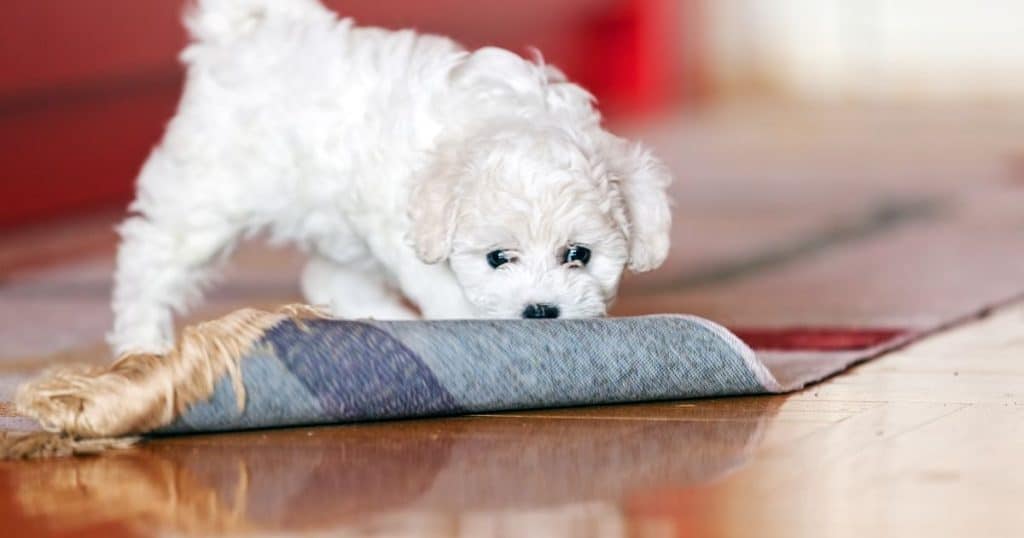
If you’re planning on leaving your Bichon Frise alone for extended periods, consider seeking professional help to ensure your furry friend stays happy and healthy. Pet sitters, dog trainers, and doggy daycares are all great options to support your Bichon Frise.
Pet sitters can provide your Bichon Frise with individual attention and care while you’re away. This can help your dog feel more comfortable and less anxious while alone. With a professional pet sitter watching over your pup, you can ensure their needs are met in a familiar environment – your own home.
Dog trainers are another excellent resource to help your Bichon Frise become more comfortable being alone. Expert dog trainers can guide you through various techniques and strategies to train your dog to become more independent and less stressed when left by themselves. With proper training, your dog can learn to relax and be content during alone time.
Finally, doggy daycares are a fantastic option for socializing your Bichon Frise and keeping them active while you’re at work or otherwise occupied. At a doggy daycare, your dog will have an opportunity to play and interact with other dogs under the supervision of experienced professionals. This can help reduce your pet’s anxiety and improve their overall behavior when left alone at home.
In conclusion, there are several professional resources available to help you ensure your Bichon Frise can be left alone without any negative consequences. Whether you choose a pet sitter, work with a dog trainer, or enroll your dog in a doggy daycare, these options can provide the support your pet needs to adjust to spending time alone.
Mental and Physical Stimulation
Bichon Frises are intelligent and affectionate dogs that can be left alone for a limited period, provided they receive adequate mental and physical stimulation. To keep your Bichon Frise entertained and healthy during your absence, regular human interaction, puzzle games, and exercise are crucial.
One way to ensure your Bichon Frise receives sufficient human interaction is to spend quality time with them before and after leaving them alone. This time together can include playing games, petting them, or taking them for a walk. By establishing a bond and a routine, your dog will feel more secure when you’re away.
In addition to quality time, providing your Bichon Frise with puzzle games is an excellent way to provide mental stimulation. Puzzle games and interactive toys will challenge their problem-solving skills and ensure their mind is active while you’re not with them. Change the puzzles and toys regularly to prevent boredom and maintain their interest.
Physical stimulation is also vital for your Bichon Frise’s well-being when left alone. Ensure that your dog has access to a safe, enclosed area for exercise, whether indoors or outdoors. Activities such as fetching toys, exploring new scents, or simply running around can help release pent-up energy and make your dog feel less stressed.
In conclusion, while it is possible to leave your Bichon Frise alone, taking proper precautions to keep their minds and bodies stimulated can significantly enhance their ability to cope in your absence. By incorporating human interaction, puzzle games, and physical activity into your dog’s routine, you can ensure a happy, content Bichon Frise even when they spend time alone.
Before You Go
In the end, whether a Bichon Frise can be left alone depends on your individual dog, their personality, and the amount of training they have received. Bichon Frises are known for their social and friendly nature, which might make them prone to experiencing separation anxiety when left alone for extended periods.
To help your Bichon Frise feel more comfortable when left alone, it is important to gradually expose them to being alone and provide positive reinforcement for good behavior. Start by leaving your dog alone for short periods, steadily increasing the time as they become more comfortable. Ensure they have a comfortable space and that their basic needs, such as food and water, are met.
Another key factor is to invest time in training and mental stimulation for your Bichon Frise. Teaching them basic commands and providing interactive toys can keep them entertained and mentally active while alone, reducing the risk of developing separation anxiety or destructive behaviors.
Incorporating regular exercise into your Bichon’s daily routine is also crucial for their overall well-being. This breed is known for its energetic and playful nature, so ensuring they get daily walks and playtime will help maintain their happiness and health, even when left alone.
Overall, the answer to “can a Bichon Frise be left alone” depends on your specific dog and the effort you put into their training and well-being. With proper care and attention, Bichon Frises can learn to manage their time alone and have a happy, healthy life.
FAQs
How long can a Bichon Frise stay home alone?
A Bichon Frise can typically be left alone for up to 4 to 6 hours. However, this time period can vary depending on individual factors such as the dog’s age, temperament, and training. It’s important to gradually increase the time your Bichon spends alone to help them become comfortable with the situation.
Do Bichon Frises experience separation anxiety?
Yes, Bichon Frises can experience separation anxiety. Some signs of separation anxiety in bichons include fearfulness, house soiling when left alone, and touch sensitivity. Training and regular exercise can help minimize these behaviors and make your Bichon feel more secure when you’re not home.
What are some tips for leaving a Bichon Frise alone?
When leaving your Bichon Frise alone, it’s important to ensure they have a comfortable and safe environment to stay in. Provide them with a cozy bed, fresh water, and some toys to keep them entertained. Establish a routine to help your dog feel more secure, and make sure to give them plenty of exercise and mental stimulation before leaving them alone.
Are Bichons suitable for working households?
Bichons can adapt well to working households as long as their needs are met. This includes regular exercise, mental stimulation, and social interaction. If you have a busy schedule, consider hiring a dog walker or engaging in doggy daycare to ensure your Bichon receives the attention and care they need.
How can I help my Bichon cope with separation?
Helping your Bichon cope with separation involves patience, training, and providing a comfortable environment. Gradually increase the time they spend alone and work on training techniques to help them feel secure. You can also use anxiety-reducing tools such as puzzle toys or calming supplements to make their alone time more enjoyable.
Are there any similar breeds that handle alone time better?
If you are looking for a breed that may handle alone time better than a Bichon Frise, consider a Maltese or a Toy Poodle. These small breeds have similar characteristics to the Bichon but may be more independent and better able to cope with being left alone. However, each dog is unique, so it’s essential to consider individual temperaments and lifestyles when choosing the right breed for your household.

